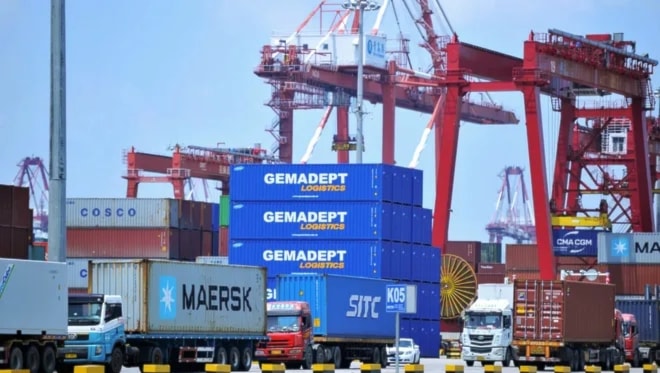China to sue US over Trump’s new tariffs
Donald Trump's 10% tariffs spark a fierce response as China moves to sue the US at the World Trade Organization.
-

Containers are transferred at a port in Qingdao in China's eastern Shandong province on August 16, 2018. (AFP)
China plans to file a lawsuit with the World Trade Organization (WTO) and implement additional retaliatory actions in response to US President Donald Trump’s new tariffs on Chinese goods, the Commerce Ministry announced on Sunday.
According to the statement, Beijing considers the unilateral tariff hike by Washington a "serious violation" of WTO regulations.
Trump announced on Saturday new tariffs on China, Mexico, and Canada, citing their failure to curb the flow of migrants and illegal drugs, including fentanyl, into the United States.
To justify the tariff increase, Trump declared a national economic emergency, invoking the International Emergency Economic Powers Act (IEEPA), which grants the president unilateral authority over imports.
The new tariffs, scheduled to take effect on February 4, impose a 25% tax on all imports from Mexico and most Canadian goods, along with a 10% tariff on Chinese products. A White House fact sheet stated that these measures will remain in place without exemptions “until the crisis is alleviated.”
Read next: China has a trillion-dollar advantage in any tariff battle: WSJ
China’s Commerce Ministry expressed strong dissatisfaction with Washington’s decision, stating that Beijing “firmly opposes” the move.
The ministry stated, “It is not only unhelpful in solving [Washington’s] own problems, but also undermines the normal economic and trade cooperation between China and the US,” adding that Beijing “will take corresponding countermeasures to firmly safeguard its own rights and interests,” without disclosing details.
It added that the US should “objectively and rationally view and deal with its own problems” such as illegal drug imports, instead of “threatening other countries with tariffs.”
The ministry announced that Beijing will formally challenge the new tariffs at the WTO, which has the authority to authorize retaliatory measures against trade restrictions. As WTO members, both the US and China are obligated to comply with its rulings in trade disputes.
Meanwhile, China’s Foreign Affairs Ministry criticized the tariffs as “not constructive,” cautioning that they could escalate tensions and potentially reignite a trade war.
Trump tariffs escalating trade tensions
This move, justified by claims of a national emergency linked to illegal immigration and fentanyl trafficking, threatens significant disruptions in industries ranging from agriculture to automotive manufacturing and energy. The tariffs are also expected to increase costs for US consumers and businesses.
Canada and Mexico are major suppliers of agricultural products, and the US auto industry is heavily reliant on these countries, with 70% of light vehicles built in North America destined for the US.
The tariffs could drive up vehicle prices, damage supply chains, and result in job losses. Experts warn that the resulting inflation could slow consumer spending and business investment, undermining Trump's economic rhetoric of deregulation and tax cuts.
The Canadian and Mexican governments have vowed to retaliate.

 3 Min Read
3 Min Read










